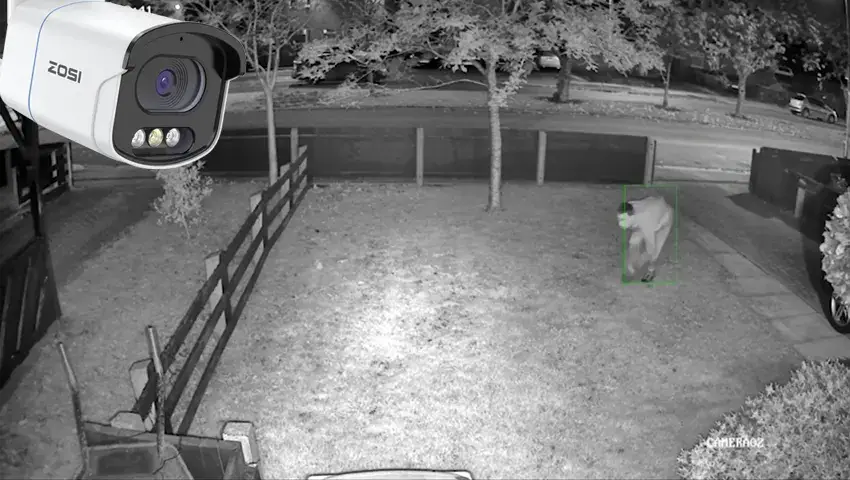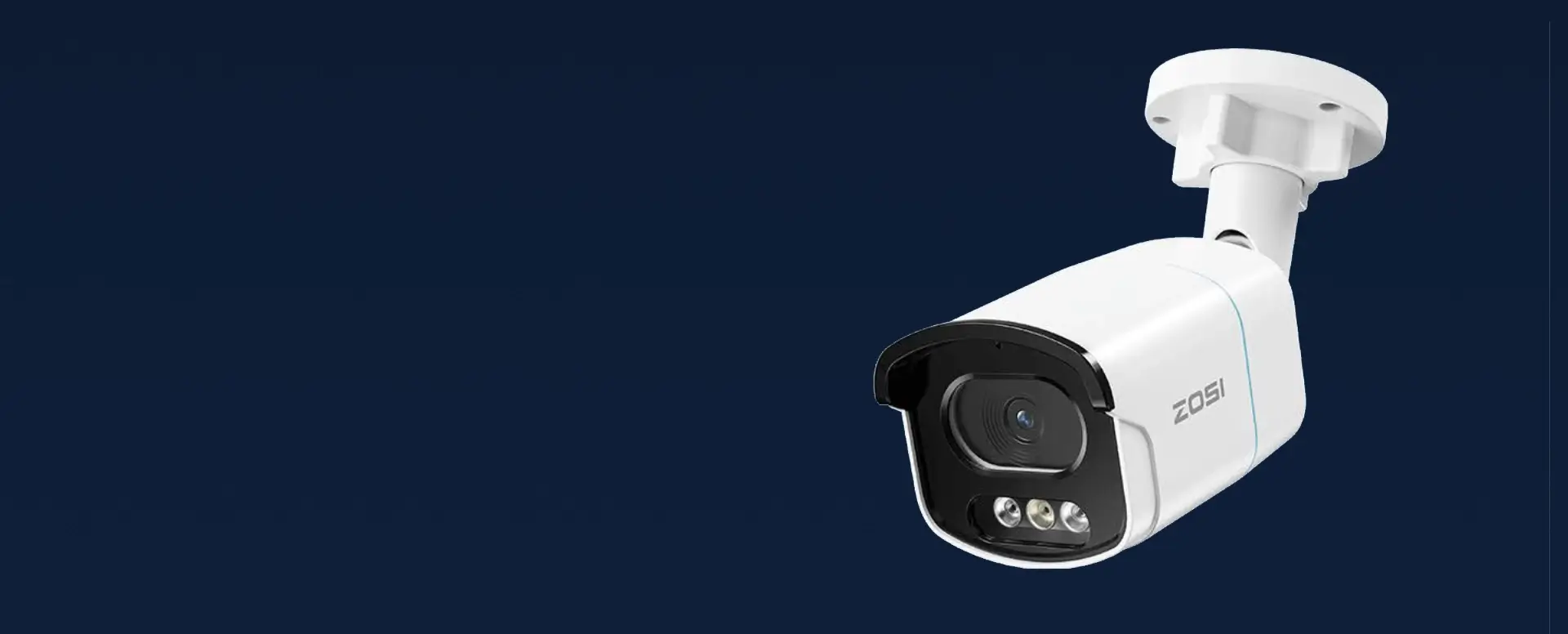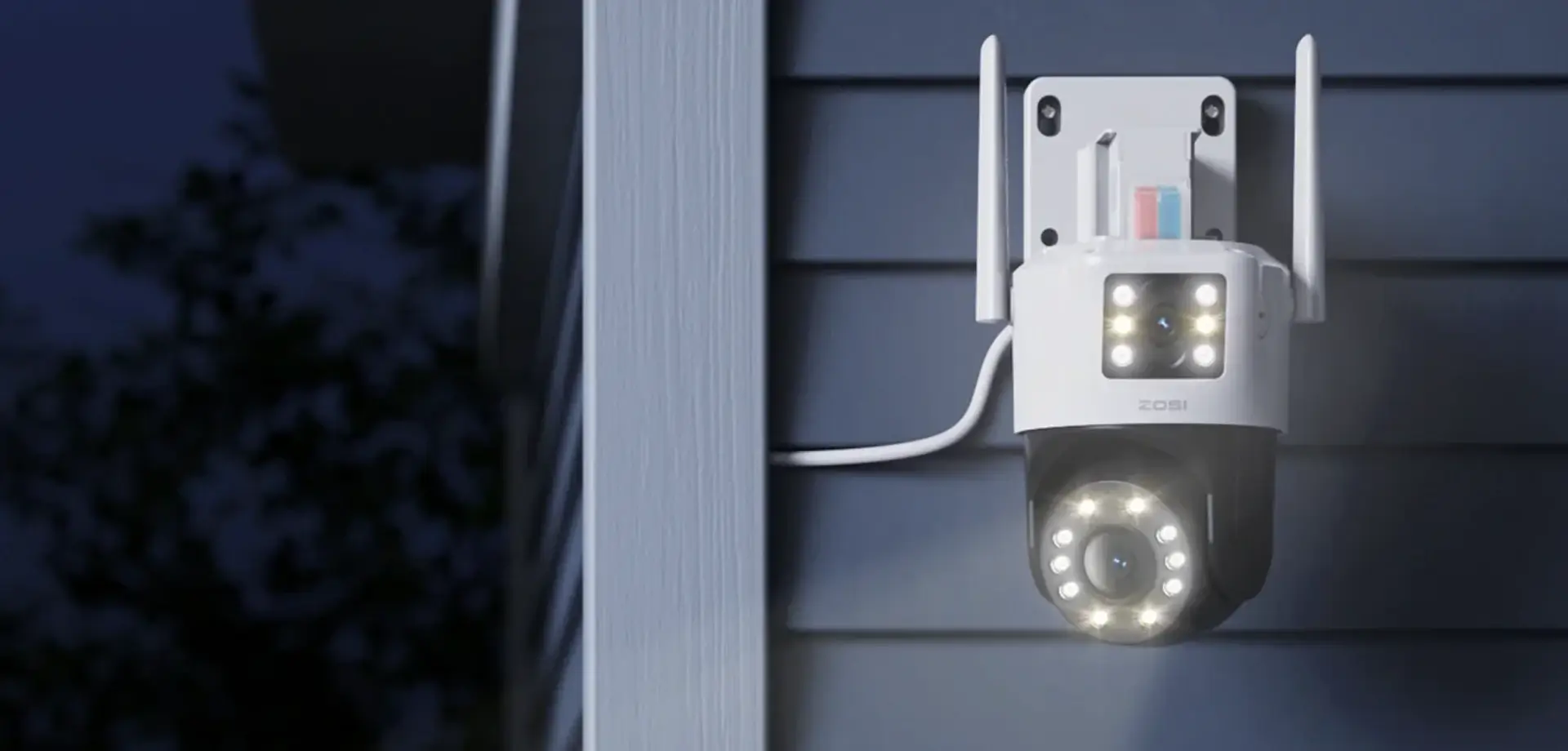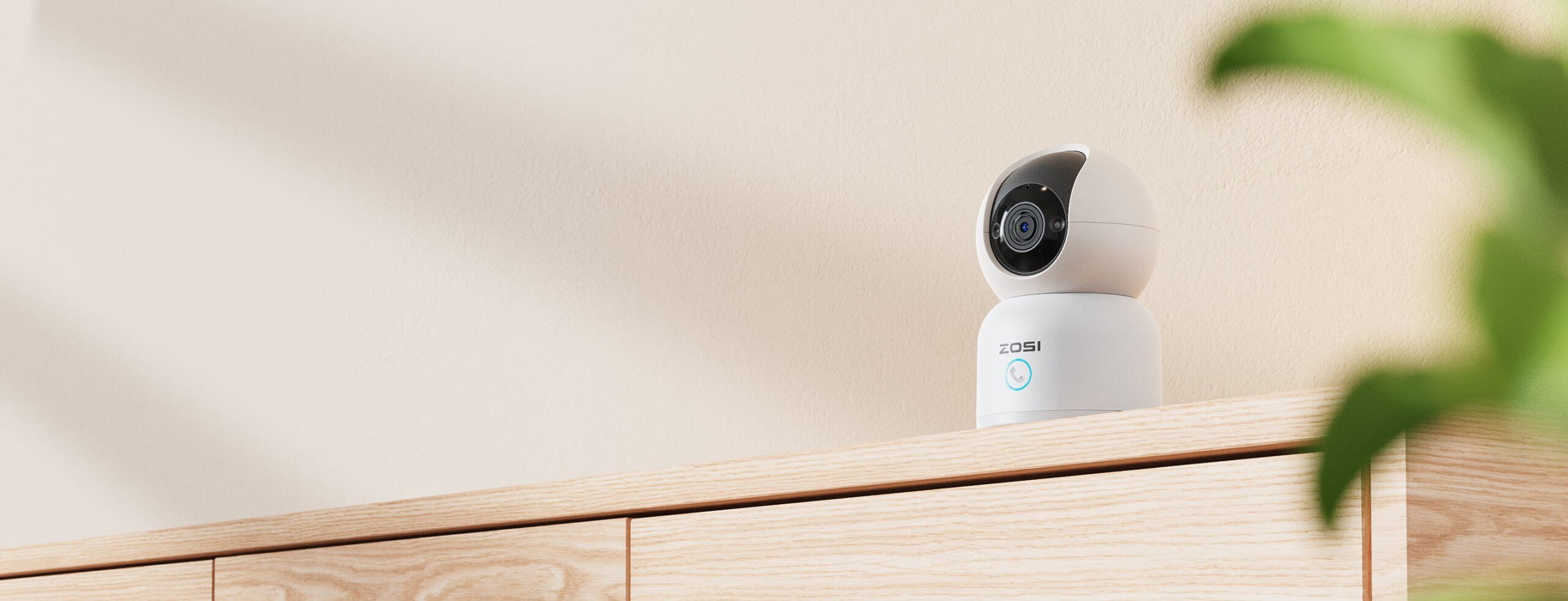Night vision security cameras are rapidly growing in popularity as the need for around-the-clock protection for homes and businesses has never been greater. But with so many options available, how do you choose the right one for your needs? Not all night vision cameras are created equal, and it’s important to consider the key factors when making your selection.
From resolution and field of view to motion detection and connectivity, there are many things to consider. And when it comes to the different types of night vision technology available, each has its own pros and cons to weigh. By taking the time to understand what’s most important for your specific situation, you can invest in a night vision security camera that provides reliable and effective protection for years to come. So why wait? Take control of your safety and security today with a high-quality night vision CCTV camera.
Contents
What Are Night Vision Security Cameras?
A night vision security camera may be just what you need. With the ability to detect motion and record clear video in low-light or no-light conditions, these cameras provide peace of mind even when you’re deep in sleep or away from your property.
But not all night vision cameras are created equal. While traditional black and white night vision cameras can be effective, they may not provide the level of clarity you need to identify criminals or gather evidence for law enforcement. That’s where color night vision cameras come in. With the ability to capture high-resolution footage in color at night, these cameras offer a clear view of what’s happening around your property – even in low-light conditions.
And with the latest breakthrough in color night vision technology – AuroraLux True Color – from Zosi, you can enjoy even clearer and more detailed images. Equipped with a super aperture, advanced image sensor, and adjustable warm light, these cameras provide exceptionally clear and color-accurate footage even when other cameras fail.
How Do Night Vision Security Cameras Work?
Night vision security cameras using infrared (IR) light to see in the dark. IR LEDs emit invisible light that the camera can capture, allowing for clear footage and dependable surveillance even in low-light or no-light conditions. While many night vision cameras rely on IR LEDs, some also use spotlights to illuminate the area and improve visibility.
However, not all night vision cameras are created equal, and different types of cameras employ different technologies to achieve the same goal.
For example, IR cameras typically have multiple built-in IR LEDs surrounding the lens, while spotlight cameras can provide even better night vision capabilities. Additionally, many IR security cameras include an IR cut filter that enables them to detect ambient light and adjust their settings accordingly for greater clarity and color during the day.
Different Types of Night Vision: Definition and Comparison
There are three main types to choose from: IR night vision, starlight night vision, and color night vision. Each type utilizes its own unique technology to achieve clear and reliable surveillance in low-light or no-light conditions.
1. The comparison of 3 types of night vision security camera:
2. IR (Infrared) night vision
IR (Infrared) night vision security cameras utilize powerful IR LEDs to emit invisible infrared light and capture clear black and white images in low-light or no-light conditions.
While IR night vision cameras can provide great convenience for home protection, the number and power of the built-in IR LEDs can greatly affect their range and effectiveness. For example, a camera with more IR LEDs will generally be able to capture clearer images in the dark than one with fewer LEDs.
Additionally, the power of the IR LED is crucial in determining the distance the camera can see – with some cameras having an IR distance up to 250ft. When selecting an IR night vision camera, it’s also important to consider the infrared light’s wavelength, ranging from 850nm to 940nm. While the latter produces no visible glow when viewed directly, it may be less effective and illuminate fewer areas than the former.
3. Color night vision with spotlight
Color night vision with spotlight are designed to illuminate everything in front of the lens with bright, white light, providing clear and full-color images even in total darkness.
And with the latest breakthrough in color night vision technology – AuroraLux True Color night vision security cameras – you can enjoy even more natural and gradual illumination without contributing to light pollution.
While starlight security cameras may be costly, color night security cameras with spotlights offer budget-friendly protection and are proven to deter would-be burglars and stop crimes before they happen.
4. Starlight night vision
Starlight security camera With image sensor technology that collects and amplifies light from stars, moon, and other objects. These cameras provide exceptional sensitivity to low light conditions and can produce sharper and clearer images than the human eye. And with sophisticated noise suppression and large-size sensors, the starlight cameras offer unparalleled image clarity and quality by collecting enough light for human faces, plate numbers, and other details.
Plus, unlike IR night vision cameras, starlight cameras can provide color night vision even in low light conditions. While some starlight cameras may switch to black and white mode for optimal clarity in extremely poor lighting conditions, the latest breakthrough technology – AuroraLux True Color night vision cameras – maintain high-quality color images in all conditions thanks to their 1/1.8″ sensor and F1.0 aperture.
Black and White VS. Color Night Vision, Which Is Better?
When it comes to selecting a night vision security camera, the choice between black and white or color footage can be complex. There is no one “right” or “wrong” answer, as both options have their own pros and cons. Before making your choice, consider these important factors:
- Image quality: While high-quality night vision cameras can capture black and white as well as colorful footage, most people prefer color night vision to get more details, such as the color of clothes or vehicles, which can be crucial for identifying criminals.
- Storage capacity: Color footage contains more information and therefore requires more storage space. If storage capacity is a big concern, black and white night vision cameras may be a better choice.
- Long range night vision: Generally speaking, black and white night vision typically offers a longer range than color night vision. But some cameras combine spotlights with IR LEDs to produce a better night vision effect.
- Price: Starlight security cameras may cost a little more because of their advanced performance while infrared security cameras are the most common and affordable options. But some cameras offer color night vision at a reasonable price.
- Installation scenarios: In some scenarios, you may need color night vision rather than black and white, particularly in areas like entrances, driveways, and front or back yards where installations are more visible and beneficial.
5 Key Features to Consider When Choosing The Best Night Vision Security Camera
Consider these key features to make an informed decision:
- Super aperture: Cameras with super aperture have larger lens openings that allow more light to reach the image sensor, resulting in brighter and clearer images true to color, especially at night. With super aperture cameras, you can enhance image quality and capture vital details, such as facial features and license plate numbers.
- High resolution: To ensure clear and detailed footage, select a night vision camera with high resolution of at least 1080p (1920 x 1080). The higher the resolution, the greater the visual detail the camera can capture – making facial recognition and license plate identification a snap.
- Long range: Choose a night vision security camera with a long-range vision capability of at least 30 feet to cover more ground and protect your property from unwanted activities at a distance. Many high-end options, such as Zosi cameras, offer long-range capability well beyond 100 feet.
- 3D DNR: Look for a quality night vision camera with 3D DNR technology to remove image noise and compensate for color blending errors. This digital noise reduction technology can produce clearer and more effective images in low light conditions.
- Wide field of view: Select a night vision security camera with a wide field of view to increase your surveillance coverage and reduce blind spots in your property. By choosing a camera with a larger viewing angle, you can capture more of your surroundings and stay aware of potential threats.
Practical Tips When Buying A Night Vision Security Camera
Investing in a night vision security camera is a smart and proactive way to protect your home or business. But with so many options available in the market, how do you know which one is right for you?
Before you buy a night vision security camera, consider these 5 essential tips to ensure that you get the best camera for your needs:
- Check the camera’s specifications – look for night vision in the list of features. Find out if there is an IR LED or spotlight, how many IR LEDs or spotlights it has, and if the IR LED is 850nm or 940nm (invisible).
- Ask the manufacturer to provide night vision video samples – this will give you a better idea of the camera’s recording quality in low-light conditions.
- Watch night vision footage shared by other customers – real-world experience can give you a better perspective on the camera’s performance.
- Read media reviews of the security camera with night vision – check out reviews on Amazon, Reddit, forums, PCMag, ZDNet, and other reputable review websites.
- Research more customer reviews of the product’s night vision – do a simple Google search to see if you can find more feedback from customers who have used the product.
Top Picks Of The Best Night Vision Security Cameras
Finding the best night vision security camera can be overwhelming with the multitude of options available. To help make the decision-making process easier, here are three top picks of night vision security cameras:
1. Super aperture AuroraLux true color night vision security camera – Zosi 1NC-186
Zosi’s latest color night vision security camera features an F1.0 super aperture and a more sensitive sensor, which captures genuine color pictures without the need for additional lighting.
Key features include 2K resolution, an adjustable warm light, and a super aperture that brightens photos by allowing more light to enter the camera.
5MP AuroraLux Security Camera - C186
- 3K/5MP Super HD
- AuroraLux True Color Night Vision
- 3000K Neighbor-Friendly Warm Light
- Smart Person/Vehicle Detection
- Light & Siren Deterrence
- Two-Way Audio Talk
- 128GB SD & PoE NVR
- IP66 Waterproof Design
2. Best weatherproof outdoor night vision security camera – Zosi 1NC-298
This long-range CCTV night vision security camera captures high-quality images even in complete darkness and adverse weather conditions. With an IP66 waterproof rating, the camera can be used indoors or outdoors.
Key features include 100 feet of long-range night vision, 8MP Ultra HD resolution, and an IP66 waterproof rating.
8MP PTZ Wifi Outdoor Camera With Dual Lens - 1NC-298
- 4MP+4MP Dual Lens
- Dual Lens Achieves Ultra-wide Field Of View
- AI Person Detection and Auto Tracking
- Starlight Color Night Vision
- Smart Motion Alerts Push
- Two-way Audio & Customize Voice Alerts
- SD Card Storage & Cloud Storage
Get more details from the night vision security camera reviews here.
Below is a video shared by a user of 1NC-298.
3. Best wireless indoor security camera with night vision – Zosi 1NC-518
Equipped with a quality image sensor, this wireless security camera offers both color and black and white night vision.
Its key features include color night vision in 3MP HD, dual-band WiFi, and clearer footage even in no-light conditions.
3MP PTZ Indoor Security Camera - 1NC-518
- 3MP Super HD
- 360° Panoramic Vision
- AI Person Detection and Auto Tracking
- 2.4GHz/5GHz Dual Band WiFi Connection
- SD Card Storage & Cloud Storage
A Guide to Troubleshooting Night Vision Security Cameras
Night vision security cameras are an essential part of a comprehensive home security system. But sometimes technical issues may arise, leaving you vulnerable and unsure of how to handle them.
If you’re experiencing problems with your night vision surveillance camera, follow these simple steps to get it back to working order:
- Check that the camera is powered on and that all cables and wiring connections are secure and aligned properly. This can be especially important for wireless models.
- Check the lens for any dust or debris. Clean the lens with a soft cloth if necessary, and ensure that it is not obscured.
- Make sure the environment is dark enough for the night vision system to work. The camera’s night vision system can only be activated if the light environment is below a certain lux value.
- Check that the infrared sensor in the camera is working correctly. If the IR light still does not appear in night vision mode, try resetting the camera.
- If the camera is not working with an NVR, try swapping the camera to a different port on the NVR.
- If you’ve tried the above steps and are still experiencing problems with your night vision security camera, don’t worry. Contact the seller from whom you purchased the camera and receive the after-sales service and professional advice that you deserve.
Why Is the Security Camera Blurry at Night?
Blurry images are a common complaint among many security camera users. Here are some reasons why security cameras may produce blurry images at night and how to address them:
1. Dust, water, and insects
Dust, water vapour, and small insects are among the most common culprits. Poorly sealed camera seams can allow dust and water vapour to accumulate on the lens or sensor, causing the video to appear fuzzy. Low-light conditions can also cause the camera lens to blur the image. Small insects can interfere with the camera’s ability to produce clear images.
2. Reflective Objects and Light Sources
Bright and reflective objects near the camera, such as walls or strong light sources, can reflect too much light onto the lens. This creates a large white area in the security camera footage while leaving the surroundings in low light, causing these areas to appear black and blurry. Ensure the camera is positioned away from these reflective objects to reduce these effects.
3. Lack of Infrared or White LED Fill Light
A camera lacking infrared or white LED fill light can produce blurry images at night. Images might turn out too dark to see clearly, and the camera’s night vision is poor, leading to blurred footage. Invest in a security camera with infrared or white LED fill light to get clear nighttime footage.
4. Camera Algorithm
The camera algorithm is designed to capture images in low light conditions by increasing the gain of the image sensor, which can increase noise levels and produce a blurry image. Adjusting the camera aperture, exposure time, or image sensor sensitivity should help reduce noise while capturing more light. These adjustments require a delicate balance.
Zosi’s algorithm has been updated for years, and the quality of nighttime footage is guaranteed.
5. Lens Flare and Ghosting
Lens flare occurs when bright light reflects onto the surface of the lens and enters the camera sensor. It can create washed-out or blurred images, and dome security cameras are particularly susceptible to this because of their transparent shield. Avoid mounting cameras in bright places to reduce lens flare, or choose a camera with a coating that reduces flare significantly.
Ghosting is another common problem that causes double images because the camera captures light reflected from nearby surfaces. It can make images appear blurred and hard to interpret. Position your camera away from bright surfaces to reduce ghosting, improving image clarity and sharpness.
6. Scratched Lens or Cover
A scratched lens or cover can also produce poor video quality, particularly at night. Choosing a scratch-resistant material for your camera will help you avoid this problem. Check the camera’s lens for scratches during the delivery and installation process, and choose a manufacturer known for using high-quality lens materials.
7. Camera Positioned Towards a Glass Window
Positioning a camera with night vision behind a glass window will result in poor image quality due to glare and lighting conditions inside and outside the house. Avoid installing cameras behind glass windows to ensure clear and reliable security footage.
FAQs
1. What Types of Security Cameras Are Best for Night?
The best type of security camera for night is a night vision camera. These cameras have an infrared light that enables them to see in the dark, providing reliable and clear video footage of your surroundings.
2. How Far Can Night Vision Security Cameras See?
A night vision security camera can provide surveillance of up to around 50 feet in complete darkness, but this range varies depending on the camera quality and the level of darkness present. However, most night vision cameras can capture clear footage in low-light or dark conditions.
3. Can Night Vision Cameras Work in Complete Darkness?
Yes, night vision security cameras can work in complete darkness thanks to their infrared technology, which allows them to capture images with no visible light. This makes them an ideal choice for businesses and homes that need added security after dark.
Conclusion
Night vision security cameras are an excellent choice for homes, businesses, or any property that requires round-the-clock protection. By investing in a high-quality night vision security camera, you’ll have peace of mind knowing that you’re safeguarded against any potential security threats day or night.
Don’t wait until it’s too late to secure your property. Invest in a top-performing night vision security camera today and keep your property in sight at all times.



